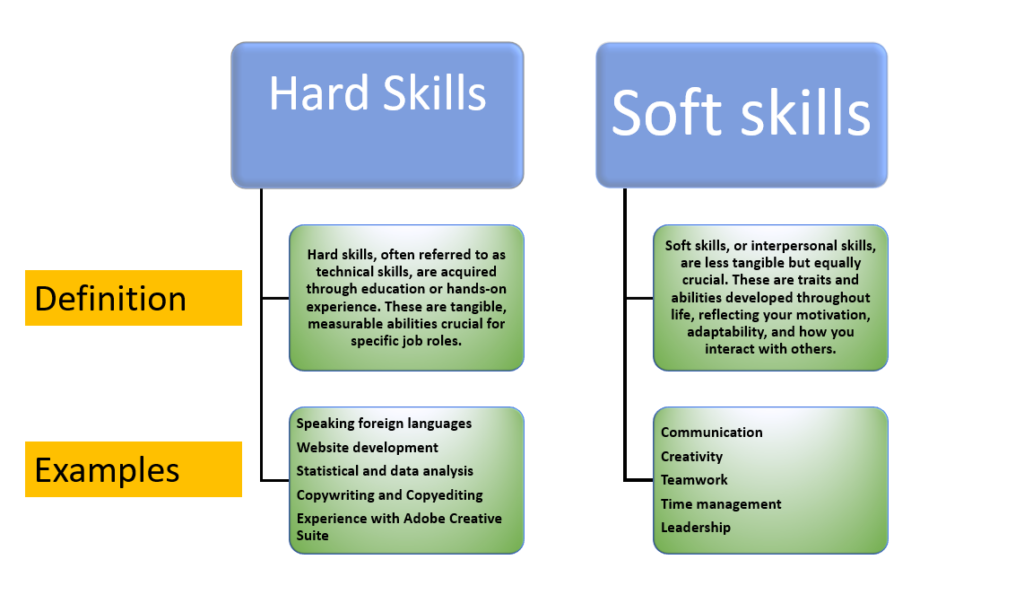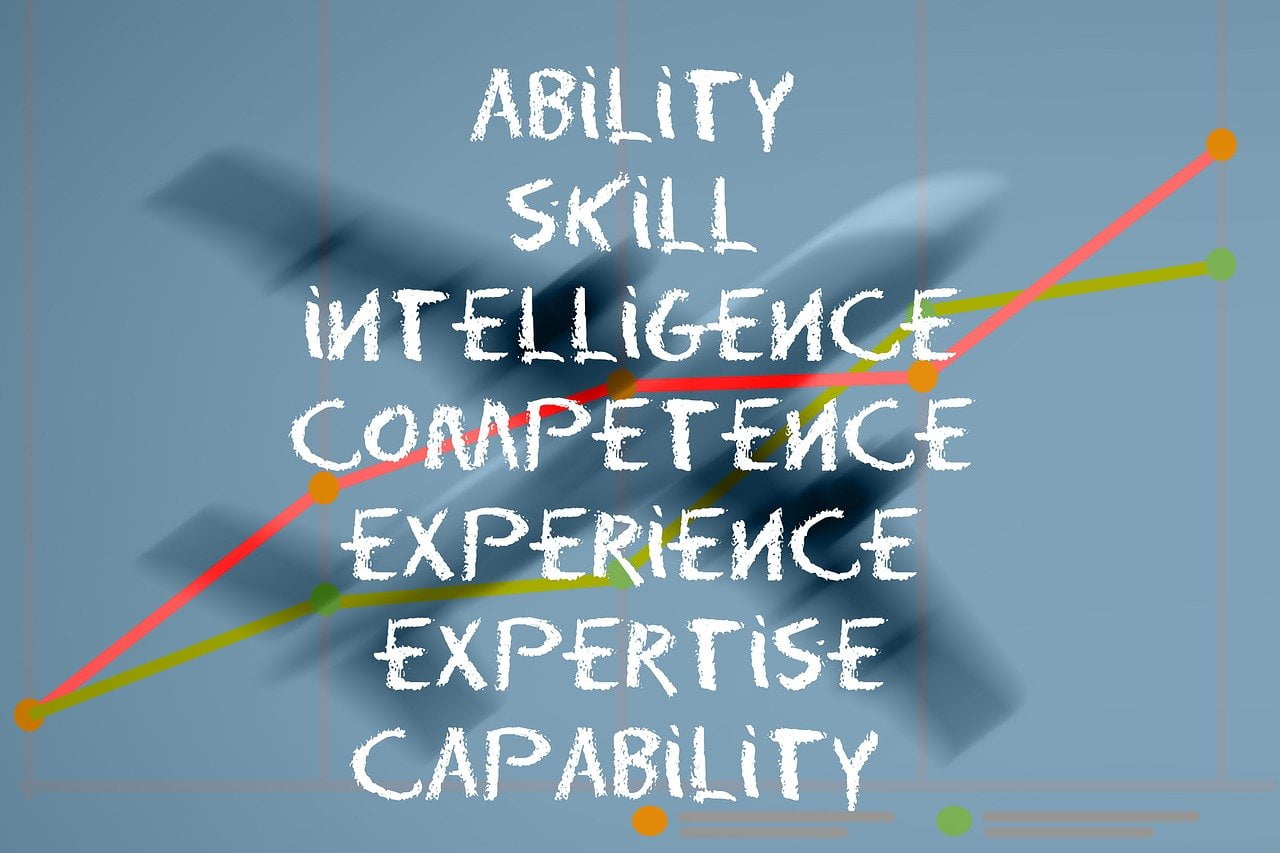Power of Hard skills and Soft Skills you must know
Is it more crucial to possess hard skills and soft skills for your career? That’s a bit of a trick question! Achieving success in any role necessitates a well-balanced combination of pertinent hard skills and soft skills. But what distinguishes hard skills from soft skills, and how can you strategically utilize each to secure a job or advance in your career?
Every profession demands a specific blend of both hard skills and soft skills, and each individual possesses a unique set of these capabilities. When seeking the ideal career path, it’s imperative to align your skill set with the requirements of the position.
In this comprehensive guide to hard and soft skills, we’ll delve into the fundamental aspects, covering:
- The definitions of hard skills and soft skills
- The significance of both hard and soft skills
- Strategies for developing hard and soft skills
- Identifying hard and soft skills in job descriptions
- Showcasing these skills effectively on your resume and in interviews
As you navigate through this article, you’re already showcasing a pivotal soft skill: the eagerness to learn!

What Is The Difference Between Hard Skills And Soft Skills?
In simple terms, the primary distinctions between hard skills and soft skills lie in their acquisition and application in the workplace. Hard skills are typically acquired through hands-on experience or formal education. Take coding, for instance – no one is inherently born with coding instincts; rather, it is a skill developed over time through schooling, educational courses, upskilling programs, or other skill development initiatives. Certain hard skills often serve as prerequisites for specific jobs, as seen in the case of coding, which holds significant importance for developers and web designers but may be less critical for roles like administrative assistants or project managers.
On the other hand, soft skills are more relational than technical, often referred to as durable skills. Examples of soft skills include time management and relationship-building. Unlike hard skills, soft skills are typically inherent traits that individuals naturally excel at, evolving without the need for formal education or hands-on training. Nevertheless, it’s important to note that soft skills can still be improved, just like hard skills.
Soft skills are imperative for most jobs, with roles such as developers, administrative assistants, project managers, and web designers all requiring some level of proficiency in relationship-building. However, the extent to which these skills are essential may vary across different roles and their day-to-day demands.
A key distinction lies in the quantifiability of hard skills compared to soft skills. Hard skills are more easily measurable, making them tangible and straightforward to evaluate. Despite this, both hard and soft skills play crucial roles in professional development.
Understanding the disparity between hard skills and soft skills empowers individuals to discern which skills to emphasize on their resumes and in job interviews. This awareness enables a more strategic approach to showcasing one’s unique skill set, contributing to a well-rounded professional profile.
What Sets Hard Skills and Soft Skills Apart?
Hard Skills: The Concrete Foundations
Hard skills, often referred to as technical skills, are acquired through education or hands-on experience. These are tangible, measurable abilities crucial for specific job roles. Whether it’s coding, proficiency in Adobe Creative Suite, or statistical analysis, hard skills are prerequisites that can be proven through certifications, portfolios, or skill assessment tests.
For instance, a web developer needs coding expertise, while a copywriter must excel in copywriting and editing. While some hard skills are non-negotiable, others can be acquired on the job, demonstrating adaptability and a rapid learning curve.
Examples of Hard Skills:
- Speaking foreign languages
- Website development
- Statistical and data analysis
- Copywriting and Copyediting
- Experience with Adobe Creative Suite
Soft Skills: The Essence of Personality
Soft skills, or interpersonal skills, are less tangible but equally crucial. These are traits and abilities developed throughout life, reflecting your motivation, adaptability, and how you interact with others. Soft skills, often known as durable skills, include communication, critical thinking, and leadership. Unlike hard skills, they are not acquired through formal education but are honed naturally over time.
Examples of Soft Skills:
- Communication
- Creativity
- Teamwork
- Time management
- Leadership
Why (Hard Skills And Soft Skills) Matter in Your Career Journey
Understanding the distinction between hard and soft skills is pivotal. Hard skills are easier to quantify, but soft skills are equally vital for professional development. Recognizing this empowers you to strategically highlight the right skills on your resume and in interviews.
Developing Your Arsenal: Hard and Soft Skills
Developing Hard Skills
To stand out in a competitive job market, continuously enhance your hard skills. Consider these avenues:
- Enroll in continuing education classes
- Follow tutorials on platforms like YouTube
- Attend workshops or webinars
- Apply new skills to personal projects
- Seek mentorship for guided learning
Demonstrating a willingness to learn hard skills quickly becomes a valuable soft skill in itself.
Developing Soft Skills
Improving soft skills requires self-awareness and intentional effort. Identify areas for improvement through self-assessment and feedback from peers. If time management or leadership skills need honing, seek learning opportunities and apply them progressively.
Showcasing Your Skills on Paper: Crafting an Impressive Resume
Hard Skills on a Resume
Create a dedicated section titled “Skills” on your resume. Tailor it to the job you’re applying for, emphasizing relevant hard skills. Strike a balance, leaving room for detailed discussions in interviews or cover letters.
Example:
**SKILLS**
Copywriting | Copyediting | Adobe Creative Cloud | Statistical Analysis | Web Development
Soft Skills on a Resume
Integrate soft skills seamlessly within the bullet points of each job experience. Relate each accomplishment to a specific soft skill, showcasing your holistic abilities.
Example:
– Utilized effective communication and leadership skills to collaborate with stakeholders on web and video content projects.
Navigating the Interview:
During interviews, leverage both hard and soft skills to leave a lasting impression. Punctuality showcases time management, while thoughtful questions express a willingness to learn. Respond to scenarios with unique yet specific answers, demonstrating problem-solving and critical thinking abilities.
Conclusion of Soft and Hard Skills
It’s not a battle between hard and soft skills but a harmonious collaboration. Soft skills shape your personality, while hard skills provide the concrete foundations. Craft a narrative that intertwines both on your resume and in interviews, portraying a comprehensive professional profile.
read related article on ITIL career growth
Once of the best YouTube video on hard and soft skills




6 comments